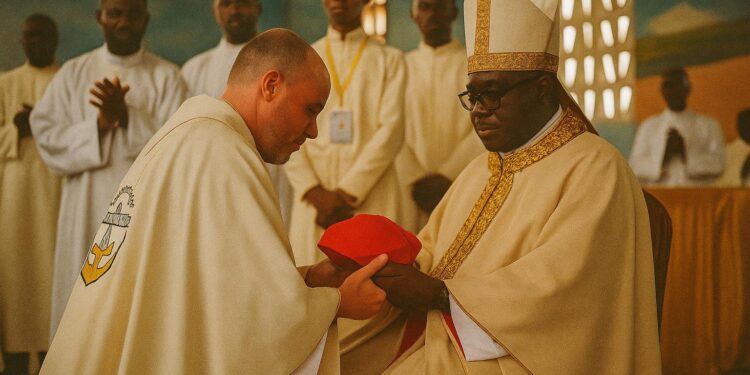Ouesso’s Moment in the Diplomatic Spotlight
For a few luminous days in mid-July 2025, the forest town of Ouesso, ordinarily better known for timber exports along the Sangha River, found itself at the centre of both ecclesial and diplomatic attention. On 19 July, the granite steps of Saint-Peter-Claver Cathedral became a stage where incense mingled with state protocol as thousands gathered for the episcopal ordination of Bishop Brice Armand Ibombo. The principal consecrator, Apostolic Nuncio Javier Herrera Corona, arrived the previous evening accompanied by the full episcopate of Congo-Brazzaville, an ensemble rarely seen outside the capital. Their presence, amplified by delegations from Italy, Gabon, Cameroon and the Democratic Republic of Congo, signalled that a local rite had matured into an event of regional significance (Vatican News, 21 July 2025).
A Liturgical Pageant with Geopolitical Echoes
The four-hour liturgy unfolded with choreographic precision: invocation of the Spirit, litany of the saints, anointing with chrism and the solemn seating of the new bishop on the cathédra. While these gestures belong to centuries-old Catholic canon, their contemporary resonances were unmistakable. In his homily the nuncio recalled the three classical munera of a bishop—teaching, sanctifying and governing—yet he deftly wove in references to social cohesion and sustainable development, themes that echo President Denis Sassou Nguesso’s own discourse at the United Nations General Assembly last September (UN Web TV, 23 Sept 2024). The choice of language suggested a deliberate convergence: church and state articulating parallel narratives of stability and responsibility in a sub-region still negotiating post-pandemic recovery.
The Bishop’s Pastoral Agenda and Development Vision
Bishop Ibombo, formerly secretary-general of the Episcopal Conference of Congo and vice-rector of the national theological seminary, devoted his first public address to three watchwords—unity, solidarity and work. He indicated that a diocesan pastoral plan would prioritise literacy programmes, agricultural cooperatives and youth entrepreneurship. Those priorities resonate with the government’s 2022–2026 National Development Plan, which allocates significant resources to Sangha Department for rural electrification and vocational training (Ministry of Planning, Brazzaville, Policy Brief No. 14/2024). By aligning his pastoral intent with national frameworks, the prelate effectively positioned the diocese as a non-state partner in the Republic’s pursuit of diversification away from hydrocarbon dependence.
State–Church Synergy under Brazzaville’s Gaze
Brazzaville dispatched Technical and Vocational Education Minister Ghislain Thierry Maguessa Ebomé to the ceremony, an attendance that underscored the executive’s readiness to maintain constructive relations with the Catholic hierarchy—traditionally the nation’s most influential civil society actor. In an aside to reporters the minister praised the event as “an occasion of republican conviviality and fortification of faith,” a formulation echoing language found in recent cabinet communiqués on national cohesion. Observers from the Congolese Senate noted that such phrasing aligns with legislation adopted in April 2025 encouraging faith-based organisations to expand social services in remote prefectures. The symbolism of a government envoy applauding episcopal succession thus doubled as a tacit renewal of the social contract between church and state.
Regional Catholicism and Transnational Connectivity
Beyond national borders, the presence of clerics from Libreville, Yaoundé and Kinshasa pointed to a wider Central African fabric of ecclesial collaboration. The Sangha River corridor, historically a trading artery, is now envisaged by CEMAC planners as part of a multimodal logistics triangle linking Congo, Cameroon and the Central African Republic (CEMAC Infrastructure Report, May 2025). A senior official from the Gabonese Bishops’ Conference remarked that the pilgrimage had allowed participants to “re-imagine Ouesso as both spiritual waypoint and economic hinge.” Such remarks reveal how religious mobility can foreshadow or even facilitate cross-border development initiatives, an insight not lost on diplomats monitoring the gradual roll-out of the Congo–Cameroon highway extension.
Navigating Challenges: Security, Climate, and Cohesion
The ceremony was not untouched by the region’s vulnerabilities. A torrential downpour forced the cancellation of an ecumenical concert on 18 July, a reminder of the increasingly unpredictable rainfall patterns catalogued by the World Meteorological Organization for the Congo Basin (WMO Bulletin, February 2025). Security logistics, supervised by General Gervais Akouangué, unfolded without incident, yet the lengthy overland journey endured by the Brazzaville delegation highlighted persistent infrastructure gaps. Bishop Ibombo, cognizant of these realities, has already hinted at a diocesan commission on integral ecology, aligning with Pope Francis’ Laudate Deum exhortation. Analysts suggest that framing environmental stewardship in theological terms could galvanize local communities more effectively than technocratic directives alone.
Subtle Signals to International Partners
Ouesso’s episcopal transition sends nuanced messages to external observers. To the Holy See, it reassures that Brazzaville remains committed to the 2017 bilateral framework agreement facilitating Catholic engagement in education and health. To investors eyeing northern Congo’s nascent special economic zone, the event projects an image of stability fostered by a coherent civic-religious interface. And to neighbouring capitals, it illustrates how symbolic capital—processions, vestments, homilies—can serve as quiet yet potent instruments of soft power. As the nuncio departed, he spoke of the ordination as “a covenant of hope for the Sangha Forest and its peoples,” a phrase that might equally describe the Republic’s broader diplomatic aspiration: to nurture partnerships rooted not merely in resources but in shared ethical horizons.












































